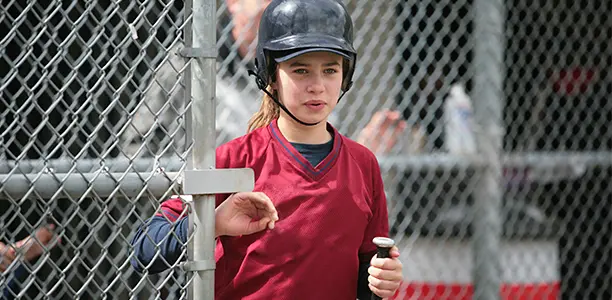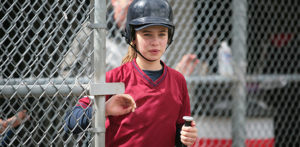
Feb 18, 2016 • 6 min read
11 Tips to Help Your Teen Prepare for the Youth Sports Arena
Posted in:
When children become teens, their experiences with organized sports change. Things may start to get a little more serious and they may become aware of the politics that can, like it or not, be part of the game.
 Just as developing physical literacy is the foundation for success in sports and in life, so too is developing a type of social and political astuteness–a certain fortitude–that will allow children to maximize their enjoyment of youth sports and encourage them to stay involved and stay active for life.
Just as developing physical literacy is the foundation for success in sports and in life, so too is developing a type of social and political astuteness–a certain fortitude–that will allow children to maximize their enjoyment of youth sports and encourage them to stay involved and stay active for life.
Here are 11 things we can teach our older children to help them successfully navigate this environment.
1. Live in and accept reality
Let your child dream of sports superstardom and imagine that their latest moves will be featured on ESPN, but also encourage your child to honestly assess his/her overall potential in a sport. This will help your child to accept playing on the appropriate team for his or her current skill level. While some people may say otherwise, participation in recreation leagues is just as valuable as participation in a competitive club or tournament team.
2. Ignore the labels
Your child may be labeled very early on as either “good” or “not good.” These labels can be completely unrelated to actual performance. “Good” players will inevitably struggle at some point and those labeled as “not good” almost always surprise everyone as they improve their own skills and physical literacy. Have your child define what good means for them and assure them that one doesn’t have to be good by someone else’s standard to stay physically active in a sport that one enjoys.
3. Adults don’t know everything
Teach your child always to demonstrate respect for adult coaches, umpires and referees, but to recognize that they are often volunteering their time, may not always be right, do not always make good decisions, and do not have all the answers. If your child happens to have the gift of an excellent coach, teach your child to be very grateful and to try to learn everything possible from him/her.
4. Encourage good sportsmanship
If you have a teenage athlete, you have a valuable opportunity to discuss the importance of good sportsmanship. By emphasizing good sportsmanship such as respect for coaches and for other teams, your child will learn that “winning at all costs” is not the ultimate goal of sports and will therefore be more likely to stay involved.
5. Better player does not make a better person
Help your child realize that other players may be better at a sport because of their playing experience or level of physical literacy. This does not mean that they are better people, although they will often act this way. If your child happens to be one of the better players, teach them to demonstrate humility and realize that they may not be better than the players in the next age group or in a more competitive league.
6. Accept that sometimes life really is unfair
Help your child to understand that the rules may be unfairly applied at times. Certain players may receive unearned or unwarranted advantages or disadvantages. Teach your child to appreciate fairness, but to not always expect it.
Regardless of your child’s current position assignment or amount of playing time, they should practice and keep their skills sharp, so they are prepared to contribute if they are called upon. They should understand that they may not be called upon (see #6) even in non-competitive leagues. And if the unfair treatment continues it might be time to have a conversation about trying a different activity or finding a different club.
8. Ask for what you want
Does your child want to play a certain position or get more playing time? Tell them to develop the skills required and then they can respectfully ask the coach for the opportunity. Your child shouldn’t expect you to ask, nag or threaten the coach on their behalf (although unfortunately, this is often effective). Your child should understand that they may be refused. Again, see #6.
9. Understand the politics
Coaches do not make decisions in a vacuum. They make decisions along with the often competing goals and agendas of players and parents. Identify for your child–but don’t dwell on–what may be influencing decisions behind the scenes.
10. Keep your options open
Being attached to one outcome such as making a certain team or playing a certain position can cloud your judgment and limit your potential. Explore all options available–including other sports.
11. If you love it, keep with it
Along with the ten tips above, prepare your children for the fact that good performance does not necessarily guarantee that they’ll make a team. However, that is not a reason to give up on a sport entirely. Let them know that they may be given ample playing time, but that they will inevitably encounter adversity and face more challenging opponents.
As difficult as it can be at times, teach them to try to embrace and rise above the frustration and the disappointment, and to come back the next day ready to play. Help them to realize that they will be stronger players and individuals for it.
Statistics show that the majority of kids want to quit organized youth sports around age 13. Given the dynamics in this environment, is it any wonder? The physical and character-building opportunities presented by youth sports are too valuable to relinquish so easily. With that in mind, I’m arming my child with not only the right equipment, training, and moral support, but also the physical and social tools he’ll need to navigate the youth sports arena and, ultimately, the game of life.
Maria Donovan lives in Baltimore where she’s busy raising her son and writing. She’s a contributor to Active for Life, a nonprofit organization committed to helping parents raise happy, healthy, physically literate kids. For more articles like this one, visit ActiveforLife.com.

